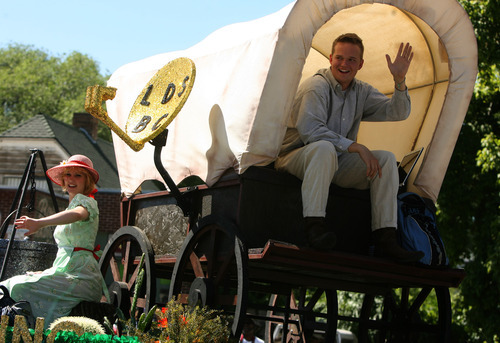This is an archived article that was published on sltrib.com in 2012, and information in the article may be outdated. It is provided only for personal research purposes and may not be reprinted.
"I like your Christ, I do not like your Christians. Your Christians are so unlike your Christ."
—Mahatma Gandhi
I remembered that quote this week as Utahns gear up to celebrate another Days of 47 holiday, an event commemorating the day when Brigham Young led Mormon pioneers into the Salt Lake Valley in 1847.
Having spent most of my nearly 62 years living as a practicing Catholic in the Mormon Zion, I have often heard disparaging remarks from non-Mormon friends about July 24th and its celebration.
Frankly, I find them tiresome and decidedly not Christian. Last time I looked, one of Jesus' greatest commandments was to "love your neighbor as yourself."
Whether talking trivial matters such as BYU-Utah football, substantial legislative debates on liquor laws and morality or simply living next to one another, we would all do well to remember that simple golden rule.
A state holiday such as July 24th should be spent celebrating all of our many Utah roots, religions and cultures. It should be a day when non-Mormons not only honor the spirit of Brigham Young — who did indeed help the pioneers make the desert blossom like a rose — but our own roles in shaping a state that, despite its quirks, remains a wonderful place to live and raise a family.
For insight on how this might happen, I researched a bit of history on the iconic This Is the Place Monument that stands at the mouth of Emigration Canyon in Salt Lake City. I wonder how many non-Mormons have ever actually studied how the monument came to be and who is honored on it.
According to Utah History to Go, a state commission in 1937 comprised of representatives of various faiths selected Mahonri M. Young, a grandson of Brigham Young, to design the monument with the idea it would be dedicated during Utah's pioneer centennial celebration in 1947.
While Mormon pioneer leaders Brigham Young, Heber C. Kimball and Wilford Woodruff are on the top of the monument, there are a number of non-Mormons honored as well.
These include the Spanish Catholic priests who came to Utah in 1776 as well as Etienne Provost, Chief Washakie, Peter Skene Ogden, Capt. Benjamin Bonneville, Father Jan DeSmet and John C. Fremont. Trappers and mountain men who came to the area 25 years before the Mormons also are celebrated.
Non-Mormons can be proud of our contributions to the state. We have built beautiful cathedrals, temples, churches, synagogues and mosques. We've established great newspapers, mining operations, stores, schools, hospitals and homeless shelters. Whether you celebrate the Greek Festival, Native American powwows, Japantown Festival, Holi, St. Patrick's Day or dozens of ethnic festivals held nearly every weekend of the year, there is certainly a place for all of us in the land of Mormons.
That said, there are often real divisions within our communities and neighborhoods, where "the different" are chastised. Whether we are conservative, moderate or liberal, too many of us, I fear, become insular, hanging out with those with whom we agree and avoiding neighbors of different faiths or political viewpoints. We become so certain of our own righteousness that we become blind to different points of view.
Yet, how strong can a faith or a political point of view be if not challenged occasionally? Is it better to go through life without thinking or considering other perspectives? Shouldn't we recognize and honor our differences while celebrating our basic humanity?
I don't know if Utah's Days of 47 is a time to consider such heady thoughts. Perhaps we ought to just enjoy having an extra summer holiday and celebrate in our own way.
This Catholic, though, would like to thank the Mormons in our community for being wonderful friends and neighbors who are justly proud of their pioneer heritage.
Twitter @tribtomwharton



